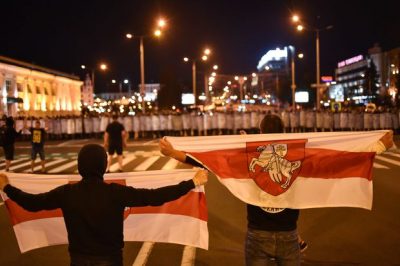Is a “Color Revolution” Possible in Belarus?

The political crisis in Belarus is getting worse day after day. As a result of elections in the country, a violent wave of protests began in several cities. The focus of the demonstrations is Minsk, the country’s capital. In the most violent night so far, 40 more policemen and 50 civilians were injured, some seriously. More than 1,000 were arrested, according to data from the Ministry of Interior.
The western media is doing a great coverage of the events, however, the news are always published with a strong ideological rhetoric, in which Aleksandr Lukashenko (elected for a new mandate with 80% of the votes) is appointed as a “terrible dictator”, against who, according to media agencies, there is a major popular uprising. The truth, however, is that the situation is much more complex than that and it is not a mere conflict between dictatorship and democracy, but a real geopolitical clash.
Lukashenko accused Poland, the Czech Republic and the United Kingdom of coordinating the protests in Belarus. This Monday at a meeting with the head of the Commonwealth of Independent States observation mission, Sergei Lebedev, Lukashenko said he had found links between the protesters and the authorities in these three countries, saying the groups involved in the protests were controlled by foreign nations. According to the Belarusian leader, these three European countries continue to order people to leave and negotiate with the authorities the voluntary surrender of power. Lukashenko went further and assured that there are also forces in the protests in Russia and Ukraine, giving no details on how he would have access to such information.
For its part, the Polish government has denied the allegations of being behind the protests, saying that these are unfounded and unproven allegations. The country’s foreign minister, Jacek Czaputowicz, said that the European Union is debating the approval of sanctions against Lukashenko, while the prime minister, Mateusz Morawiecki, demanded an urgent meeting of the European Council, but involvement in the demonstrations was not admitted. The United Kingdom and the Czech Republic have yet to comment on the serious accusations. In line with Poland, European Commission President Ursula von der Leyen described the violent unrest in Minsk as “cruel reprisals against peaceful demonstrators”, while European Council chief Charles Michel demanded policies from Lukashenko to guarantee freedom of expression, freedom of assembly and fundamental human rights.
In Russia, Vladimir Putin congratulated Lukashenko on his re-election and said he was committed to promoting relations between the two countries – relations that have been overshadowed since the end of July by the arrest of about thirty Russian citizens in Belarus, where they would have arrived to organize riots during the electoral campaign, which prompted Lukashenko’s harsh pronouncements about Russia. However, a recent journalistic investigation revealed that these people were the victims of a covert operation by the Ukrainian intelligence service, whose aim was precisely to destabilize ties between Moscow and Minsk. Belarus’ authorities continue to investigate the case.
One fact that seems to be being ignored by all analysts who have commented on the case so far, however, is the fact that the West has long been interested in carrying out a coup in Belarus. Lukashenko is commonly referred to among Western politicians and academics as “the last dictator in Europe” and his policies are highly disapproved in any western country. Still, the historical ties between Belarus and Russia are very disturbing to the Western powers, mainly the US, which see in the alliance between the two countries a great threat to the western strategy for Europe.
In 2019, RAND Corporation, one of the largest Western think tanks, published a document in which it openly defended Belarus’ political destabilization through a colorful revolution or similar means, with the explicit aim of delivering a strategic blow against Russia. Western strategists – American and European – consider it important to neutralize Minsk in order to move forward with a siege agenda against Russia. In the publication, it is suggested that, before resorting to more aggressive means, such as a color revolution, the US should offer financial support to Belarus and try to encourage a break in ties with Moscow through diplomatic means, considering that Russia could take the maneuver in Belarus as offensive and organize harsh responses.
Little is known so far and it is difficult to predict what the situation in Belarus will look like from then on, however, whether or not there is foreign coordination behind these protests, it is necessary to consider the explicit fact that the West wants to neutralize Belarus as a National State to prevent a closer relationship between Minsk and Russia. It may not be happening now, but most likely a color revolution scenario will be fostered in Belarus in order to transform the country into a “new Ukraine”.
*
Note to readers: please click the share buttons above or below. Forward this article to your email lists. Crosspost on your blog site, internet forums. etc.
This article was originally published on InfoBrics.
Lucas Leiroz is a research fellow in international law at the Federal University of Rio de Janeiro.
Featured image is from InfoBrics

